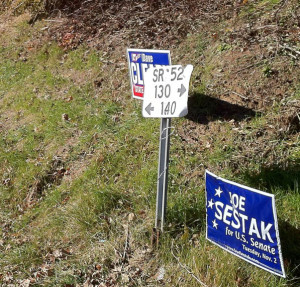Black and white mentality needs to give way to compromise, consensus
By Mike McGann, Editor, UnionvilleTimes.com
I was driving down Route 52 the other day and a passel of abandoned campaign signs prompted me to start thinking about what, if any, conclusions, one should draw from the recent election results and how it applies to life around here.
 Yes, it’s obvious that people are angry, frustrated and more than a little scared — the last two, maybe three elections tell us that, even with their wildly differing outcomes. But there is likely a deeper story to be told — and we’ve seen, and are seeing it play out right here in Unionville.
Yes, it’s obvious that people are angry, frustrated and more than a little scared — the last two, maybe three elections tell us that, even with their wildly differing outcomes. But there is likely a deeper story to be told — and we’ve seen, and are seeing it play out right here in Unionville.
Let’s go back a few years, though, first. We can probably talk, argue, shout all day about the bond issue and the Unionville High School renovation. Twice, the voters said “no.” The board of education found a way to pay for it without a public referendum and for good or bad, the project is well under way. What was most striking was the lack of a middle course — a scaled down version that would have met most of the needs of the school, while offering some relief to taxpayers.
The options were either black or white. Where was grey?
We’re seeing much of the same issue with the current teachers’ contract negotiations, which continue Monday, after a session last Wednesday. The district is offering an 1.8% over four years, while the teachers are asking for more than 4%.
Both sides are pretty dug in — we have board members tossing out consumer price index information (which in this economic environment is somewhat deceptive in terms how much inflation the average Unionville family is facing; I know fuel, energy and health insurance are up and will be up much more than 2% — and that doesn’t include my real estate taxes, the school portion of which went up 2.9%).
It’s safe to argue that in the real world — the one you and I live in — a 1.8% increase isn’t likely to give teachers the same spending power, especially when they will be facing additional costs in health care insurance. You can spout CPI all you want, but like a lot of statistics, anyone who works, shops and feeds a family knows that prices continue to go up.
And yes, we know that for average workers, salaries are down about 2%. Unionville’s teachers, though, are hardly average — as a staff, they have helped to make Unionville arguably one of the top three school districts in the state, something that enhances all of our property values, not to mention quality of life and, oh yeah, the future of our kids.
So there’s some validity to the argument that the school board wants BMW quality at Toyota pricing.
Of course, there’s an equally valid flip side to the argument:
Should the teachers get the money they want, they can look forward to staff reductions — some fairly deep, and an arguably worse educational experience for students. Between the lower revenue from real estate tax and other sources, the debt service on the high school and the pension mess something will have to give. That something will be jobs, teaching jobs. Is it worth it to see some of our younger teachers taking orders for lattes at Starbucks, rather than teaching fourth grade because the union fought to the last man to get a great contract?
From those standpoints, the board’s offer doesn’t seem fair, but then neither does the teachers’ proposal.
So whatever happened to fair? Well, on one side you have board members elected to cut spending after the renovation made so many voters angry. On the other side, you have the forces of organized labor, who see this a something of a test case (when you hear the words “model contract” bandied about, it’s a sure sign of things headed downhill and rapidly).
And frankly, there are downsides to either side getting exactly what it wants.
As we’ve seen, both locally and nationally, when one side wins without compromise, the other side comes back with a vengeance and we have this “policy oscillation” where we just get jerked around instead of making steady progress.
The best answer is a meeting somewhere in the middle — where each side compromises and a some creative structures (smaller pay hikes up front, with larger ones in the final two years, as its highly likely the economy will continue to recover, and tax revenue should increase) are used to craft something everyone can live with, that could stop the back and forth.
If nobody loses, everyone has a chance to win.
If you’re pro-education, it means keeping all of these fabulous teachers. If you’re fiscally conservative, it means avoiding a wave election that would rework the board into a less financially prudent mix, and likely mean a return to max tax hikes and spending policies that led to the high school renovation project.
I’m not saying that it will be easy, but a moderate path here is the most sustainable.
If this becomes about putting a scalp on the wall, whichever side emerges as the victor, then we all lose.







